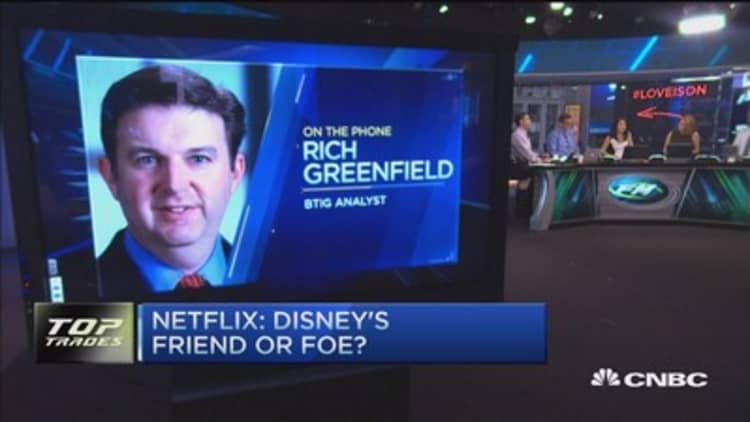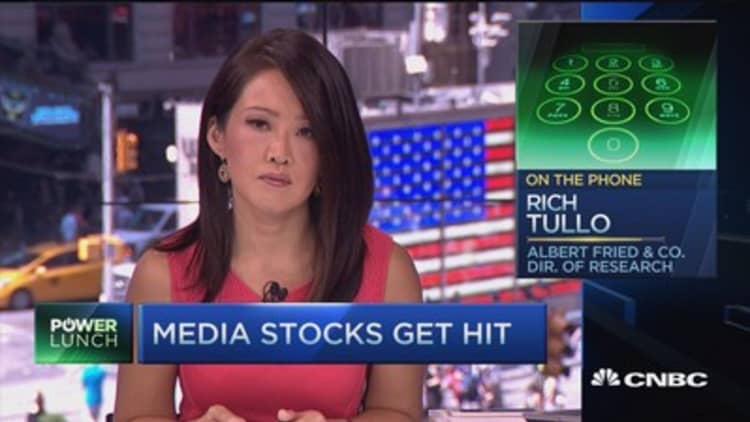Media stocks were battered this week as investors appeared to lose faith in entertainment companies, as fears intensify about clients scaling back on traditional cable packages.
Some industry watchers say the worst is yet to come, as big media's strategies for adapting to the fast-growing over-the-top service model could be making its troubles worse, at least in the short term.
The media conglomerates once insisted that so-called cord cutters—people who forgo big cable bundles in favor of Internet video—would have very little impact on the overall market. Now, the traditional outlets are working fast to adapt to the new atmosphere with hopes of limiting the downsides of the evolution.
Read MoreThe 3 words that wrecked Disney
Fears that more and more consumers will abandon the bundled cable model were highlighted this week when Walt Disney said the ESPN network, once thought to be isolated from the negative impacts of cord cutting, saw subscriber figures fall during the second quarter. The company reduced its growth expectations for the cable television segment, which includes the sports broadcasting network.
Note to old media: You're not Netflix
Efforts by companies like Disney to partner with online services like Netflix and Hulu are just making their problems worse, said Rich Greenfield, a media analyst at BTIG Research. The firm has a "neutral" rating on Disney and a "buy" rating on Netflix.
Disney doesn't think so. In an interview with CNBC on Wednesday, the company's CEO, Bob Iger, said he views "Netflix as friend not foe," adding that he saw no reason to "try to beat Netflix."
In fact, Disney will allow Netflix to stream of some of its top programs—including the popular ABC drama "How to Get Away with Murder," and plans to license its 2016 film slate to the company.
Read MoreStocks crushed post earnings: GMCR, FIT, TSLA & more
That could do more harm than good in the long run, according to Greenfield.
"All of these companies have been very interested in monetizing the one company that's paying lots of money for good content, which is Netflix," Greenfield said in an interview with CNBC.
But licensing content to streaming providers will ultimately make consumer interest in watching linear television decrease at an even faster pace, he said.
"This is really the industry literally doing it to themselves and you're seeing the pain that's just starting," Greenfield said, adding that its current survival tactics will ultimately hurt advertising and drive people toward outside on-demand platforms.
"This is a classic prisoner's dilemma game," Greenfield said. "This whole industry [is struggling as] advertisers are looking more to mobile devices."
Many larger media companies have taken approaches similar to Disney's, trying to benefit from the popularity of streaming platforms like Netflix and Hulu, while others have attempted to create their own platforms.
"There's a secular shift going on in media, a shift in consumption of information to entertainment, we've seen it in advertising for the last several quarters. There's been a worry that you're going to see it in affiliate fees, which are directly tied to the number of subscribers to those channels," said research analyst Chris Marangi, who covers cable, satellite and entertainment companies for Gabelli Funds.
Read MoreNetflix of porn? Pornhub offers hi-def streaming
Affiliate fees, revenue generated from distributors, had been a saving grace for Disney and many of its peers, but those are forecast to fall across the board, according to some estimates.
If that happens, the natural next step will be for the media companies to turn on each other and self-destruct, according to John Rose, a consultant with the Boston Consulting Group.
Netflix—whose shares hit a new high on Wednesday—topped estimates during the second quarter, adding a record 3.28 million net new additions, bring its total number of users to 65.6 million.
And Netflix isn't the only threat. In a note released earlier this week, Morgan Stanley analyst Benjamin Swinburne warned that television spending could turn negative if Facebook—which beat Wall Street's estimates with a 43 percent increase in second-quarter ad revenue—joins Google's YouTube as a real replacement for TV.
Trying too hard?

Television is still considered the ultimate advertising platform, but that will likely change in the coming year as advertisers and financial investors notice the underlying softness in the media industry, according to Rose of Boston Consulting.
Perhaps seeing the writing on the wall, most big media companies have begun experimenting with over-the-top services.
Time Warner's HBO network recently announced an agreement with Verizon that would allow the carrier's Internet subscribers to access HBO Go without subscribing to a cable package. CBS also recently launched a stand-alone streaming version of its premium cable channel Showtime.
Last month, Comcast, CNBC's parent company, announced a new video streaming service that would allow its Internet users to watch live TV from about a dozen networks without purchasing a cable bundle. The service, called Stream, will launch in Boston at the end of the summer with a price tag of $15 a month.

Comcast plans to make Stream available everywhere within its footprint by early next year.
Read MoreAmid media carnage, opportunities may abound
Satellite provider Dish Network is betting on its new Sling TV service, a slimmed-down, $20-a-month package that aims to reach customers who do not want to pay for more expensive traditional TV service.
Dish didn't break out the actual subscriber figures for Sling in its quarterly report Wednesday, but analyst firm Moffett Nathanson says the company added an estimated 105,000 Sling TV subscribers and lost about 187,000 satellite subscribers, according to its research.
Disney, Time Warner, Dish and Netflix did not immediately respond to CNBC's request for comment.
Despite the majority of the networks beating on the top and bottom lines, investors are growing skeptical. The S&P media sector is currently having it's worst week since 2008 when it declined 21.87 percent.


